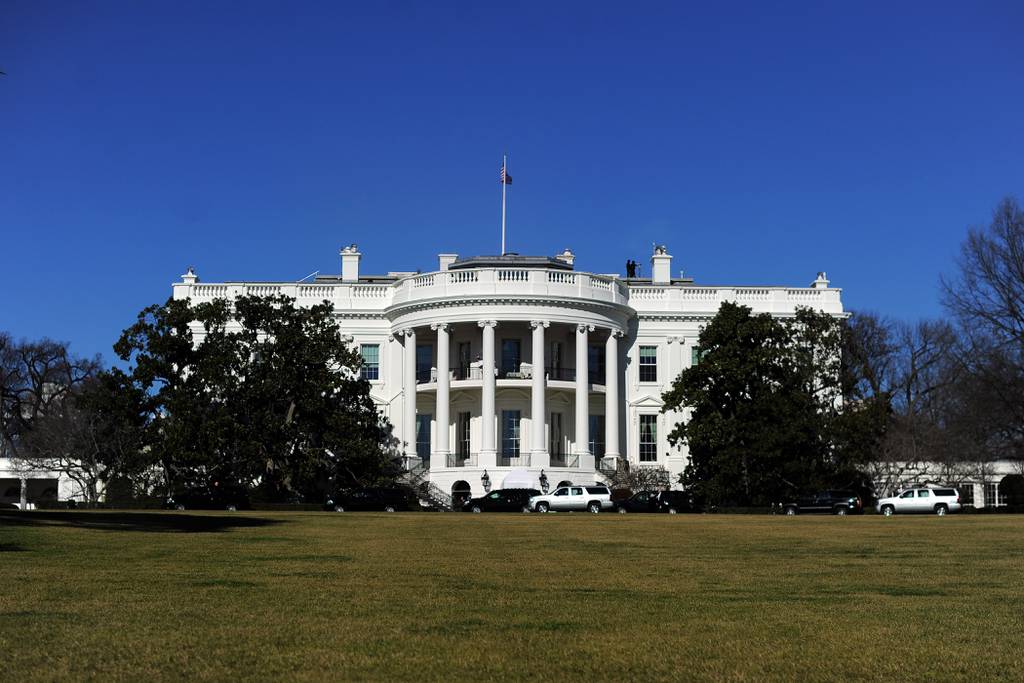
WASHINGTON ― The White House on Monday told lawmakers it opposes a provision in the House’s annual defense policy bill that would create a special inspector general for Ukraine aid, modelled after the Special Inspector General for Afghanistan Reconstruction.
The Ukraine inspector general was one of several provisions in the fiscal 2024 National Defense Authorization Act that the White House, in an Office of Management and Budget statement on the bill, told Congress it wants removed.
The statement also objected to several provisions in the bill related to the U.S. nuclear arsenal and addresses the Pentagon cost assessment office drawn into a debate over Navy ship procurement. The House is expected to begin voting on the FY24 NDAA as early as Wednesday.
Rep. Matt Gaetz, R-Fla., added the language to create the Ukraine inspector general when the Armed Services Committee marked up the NDAA in June and eventually voted 58-1 to advance the $874 billion bill to the House floor. The House’s defense spending bill, which the Appropriations Committee advanced 34-24 in June over Democratic objections, would fund the Ukraine inspector general.
The White House statement argued the Pentagon Inspector General and the Government Accountability Office “are currently undertaking multiple investigations regarding every aspect of this assistance — from assessing the [department’s] processes for developing security assistance requirements to evaluating the end-use monitoring processes for delivered assistance — at the request of the Congress.”
While the Pentagon, State Department and U.S. Agency for International Development inspectors general have a joint oversight plan for Ukraine aid, Republicans say a special inspector general can provide an additional, more coordinated layer of oversight.
The Pentagon said in June a $6.2 billion accounting error inflated the costs of equipment the U.S. has sent to Ukraine, prompting Republicans on the House Oversight Committee to ask Defense Secretary Lloyd Austin for a staff-level briefing last week. The error means the Defense Department has more funds available to transfer weapons to Kyiv than it previously thought.
Congress has appropriated $35.4 billion in emergency military aid for Ukraine for FY23, and the Pentagon has said it expects to ask for additional defense funds for Kyiv before the end of the year. The House NDAA also authorizes $300 million in longer-term aid through the Ukraine Security Assistance Initiative — the same amount the Biden administration asked for in its budget request.
Nuclear arsenal
The White House also noted in the statement it “strongly opposes” several nuclear provisions in the House NDAA. That includes language that would institutionalize the sea-launched cruise missile nuclear program and hinder the retirement of the B83 megaton gravity bomb.
The House NDAA — and its Senate equivalent — would provide nearly $196 million for continued SLCM-N development while making it a Navy program of record via a provision inserted by Rep. Doug Lamborn, R-Colo., over Democratic objections. The Biden administration has sought to scrap research on SLCM-N and did not request funding for it in its FY24 budget request.
“Deploying SLCM-N on Navy attack submarines or surface combatants would reduce capacity for conventional strike munitions, create additional burdens on Naval training, maintenance, and operations, and could create additional risks to the Navy’s ability to operate in key regions in support of our deterrence and warfighting objectives,” the White House statement notes. The statement identifies other options the military already has, like the W76-2 low-yield submarine-launched ballistic missile warhead, the air-launched cruise missile and the B61-12 nuclear gravity bomb.
The House bill also halts the Biden administration’s efforts to retire the B83 megaton gravity bomb, at least 80 times more powerful than the bomb the U.S. dropped on Hiroshima, until the Pentagon gives Congress a report on alternative capabilities to strike a hard-and-deeply buried target.
The Biden administration in its new statement said it opposes a push for what could be a clearer catalog of spending on nuclear command, control and communications, the avenues through which the arsenal is readied, coordinated and launched.
Members of the House strategic forces panel earlier this year sought to establish a major force program for NC3, an opaque topic.
Major force programs are featured in Pentagon budgets as collections of related programs and resources. Establishing a major force program specifically for NC3, the White House said, would require a “complicated” extraction and collation of “hundreds of embedded program elements and budget lines.” The move, it continued, would be administratively burdensome and disruptive to ongoing efforts — ultimately delaying a much-needed overhaul.
The Congressional Budget Office previously estimated that plans to replace aging NC3 systems would cost $77 billion between 2019 and 2028. The Biden administration’s Nuclear Posture Review, published last year, promised to modernize and further insulate nuclear command and control, especially when it comes to cyber, space-based and electromagnetic attack.
Ship procurement and cost assessments
The White House also took issue with the bill’s efforts to continue procuring the next San Antonio-class amphibious warfare ship, an ongoing debate that has prompted House Republicans to try to abolish the Pentagon’s Cost Assessment and Program Evaluation office.
Its statement objected to $750 million “in requested incremental funding” introduced by Rep. Trent Kelly, R-Miss., that would allow the Pentagon to begin purchasing the next San Antonio-class amphibious warship in FY24, even though procurement would not normally begin to FY25.
Lawmakers in both parties have vehemently pushed back against the Pentagon’s “strategic pause” in amphibious ship procurement despite strong opposition from the Marines, which asked for $1.71 billion to buy the next ship in FY24 in its unfunded priorities list.
House Republicans cited the amphibious ship pause as part of their justification for an NDAA provision that would abolish the Cost Assessment and Program Evaluation Office and move its duties elsewhere, accusing the office of slowing down the acquisition process.
The White House said it “strongly opposes” abolishing the office, arguing it has “helped reduce acquisition program cost breaches from over six per year to just over two per year” while providing “independent, fact-based evaluation of competing resource requests from across the department.”
Finally, the White House said it “strongly opposes” the bill’s $1.5 billion reduction in authorized funding for the submarine tender replacement.
Bryant Harris is the Congress reporter for Defense News. He has covered U.S. foreign policy, national security, international affairs and politics in Washington since 2014. He has also written for Foreign Policy, Al-Monitor, Al Jazeera English and IPS News.
Colin Demarest is a reporter at C4ISRNET, where he covers military networks, cyber and IT. Colin previously covered the Department of Energy and its National Nuclear Security Administration — namely Cold War cleanup and nuclear weapons development — for a daily newspaper in South Carolina. Colin is also an award-winning photographer.
- SEO Powered Content & PR Distribution. Get Amplified Today.
- PlatoData.Network Vertical Generative Ai. Empower Yourself. Access Here.
- PlatoAiStream. Web3 Intelligence. Knowledge Amplified. Access Here.
- PlatoESG. Automotive / EVs, Carbon, CleanTech, Energy, Environment, Solar, Waste Management. Access Here.
- BlockOffsets. Modernizing Environmental Offset Ownership. Access Here.
- Source: https://www.defensenews.com/congress/2023/07/10/white-house-wants-ukraine-inspector-general-out-of-defense-bill/
- :has
- :is
- :not
- :where
- $UP
- 19
- 2014
- 2019
- 2024
- 2028
- 70
- 80
- a
- ability
- accountability
- Accounting
- acquisition
- across
- Act
- added
- Additional
- addresses
- administration
- advance
- advanced
- Affairs
- AFGHANISTAN
- After
- against
- agency
- Aging
- Aid
- AL
- allow
- already
- also
- alternative
- amount
- an
- and
- annual
- appropriations
- ARE
- argued
- armed
- Arsenal
- AS
- aspect
- Assessing
- assessment
- Assistance
- At
- attack
- austin
- authorization
- authorized
- available
- award-winning
- back
- BE
- before
- begin
- between
- biden
- Biden Administration
- Bill
- Billion
- bomb
- both
- both parties
- breaches
- Briefing
- budget
- Budgets
- buy
- by
- CAN
- capabilities
- Capacity
- catalog
- cited
- clearer
- cold
- collections
- comes
- committee
- Communications
- competing
- Congress
- Congressional
- continue
- continued
- control
- conventional
- coordinated
- Cost
- Costs
- could
- covered
- covers
- create
- cruise
- Currently
- cyber
- daily
- debate
- Defense
- Defense Department
- delivered
- democratic
- Department
- Department of Energy
- Despite
- developing
- Development
- DID
- disruptive
- down
- drawn
- dropped
- Earlier
- Early
- efforts
- elements
- elsewhere
- embedded
- emergency
- end
- energy
- English
- equipment
- error
- especially
- establish
- establishing
- estimated
- evaluating
- evaluation
- Even
- eventually
- Every
- expected
- expects
- extraction
- featured
- Fiscal
- Floor
- For
- Force
- Forces
- foreign
- foreign policy
- from
- fund
- funding
- funds
- further
- General
- gives
- Government
- Government Accountability Office
- gravity
- Have
- he
- hinder
- House
- HTTPS
- identifies
- images
- in
- includes
- Initiative
- International
- into
- introduced
- Investigations
- issue
- IT
- ITS
- joint
- jpg
- june
- just
- Key
- language
- Last
- Last Year
- launched
- lawmakers
- least
- like
- lines
- maintenance
- major
- Making
- management
- marked
- means
- Military
- million
- modernize
- Monday
- monitoring
- more
- move
- much-needed
- multiple
- namely
- National
- national security
- nearly
- networks
- New
- news
- next
- normally
- noted
- Notes
- nuclear
- Nuclear weapons
- objectives
- of
- Office
- on
- ONE
- ongoing
- opaque
- operate
- Operations
- opposition
- Options
- or
- Other
- our
- out
- over
- Overhaul
- Oversight
- panel
- part
- parties
- pause
- pentagon
- per
- photographer
- plan
- plans
- plato
- Plato Data Intelligence
- PlatoData
- policy
- politics
- powerful
- previously
- process
- processes
- procurement
- Program
- Programs
- promised
- provide
- providing
- provision
- published
- purchasing
- Push
- pushed
- record
- reduce
- reduction
- regarding
- regions
- related
- Removed
- replace
- replacement
- report
- reporter
- Republicans
- request
- requested
- requests
- require
- Requirements
- research
- resource
- Resources
- retirement
- review
- risks
- s
- Said
- same
- San
- say
- secretary
- security
- Senate
- sent
- Services
- several
- since
- SIX
- Slowing
- sought
- South
- South carolina
- space-based
- special
- specifically
- Spending
- State
- State Department
- Statement
- Strategic
- strike
- strong
- support
- Surface
- Systems
- Target
- Tender
- than
- that
- The
- their
- this
- this year
- though?
- thought
- Through
- times
- to
- took
- topic
- Training
- transfer
- try
- two
- u.s.
- Ukraine
- Ultimately
- until
- via
- voted
- Voting
- wants
- war
- washington
- Weapons
- Wednesday
- week
- What
- when
- which
- while
- white
- White House
- with
- would
- written
- year
- zephyrnet












